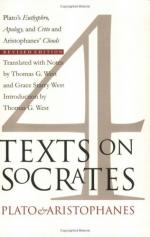|
This section contains 898 words (approx. 3 pages at 300 words per page) |

|
Similarities between Aristophanes' "Lysistrata" and Euripides' "Medea"
Summary: The difference of poetic tone between Aristophanes' "Lysistrata" and Euripides' "Medea" could not be more apparent. However, both plays share similar characteristics. Both include female characters who contradict the stereotypical woman and possess characteristics similar to the Homeric Greek warrior. These characters are shrewd, powerful, masculine women who use the art of manipulation to accomplish their goals.
The poetic tone of Aristophanes' Lysistrata differs greatly from the poetic tone of the Greek tragedies we have read in class. However, after analyzing this Greek comedy, it seems to share some of the main characteristics of Euripides' Medea. Within these plays, we meet shrewd, powerful masculine women who use the art of manipulation to get what they want from others and to accomplish their goals. This theme of manipulation is employed through various means and techniques. The women of these plays also seem to contradict the stereotypical woman and have characteristics similar to the Homeric Greek warrior.
In the opening scene of the Medea, the nurse tells the audience of Medea's sorrow. Although Medea has done everything possible to please Jason including committing crimes in his behalf, Jason leaves her and decides to wed the daughter of Creon, the king of Corinth. Though Jason is able to...
|
This section contains 898 words (approx. 3 pages at 300 words per page) |

|


